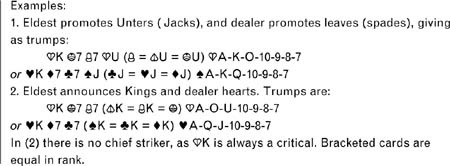The Penguin Book of Card Games: Everything You Need to Know to Play Over 250 Games (110 page)
Read The Penguin Book of Card Games: Everything You Need to Know to Play Over 250 Games Online
Authors: David Parlett






Also, there is no restriction on table talk. You may announce
what cards you hold (truthful y or untruthful y), or expose any of
them, provided that everyone can see them, and either ask or tel
your partner what card to play at any given point.
Score The increasing game value and current score are recorded
with chalk on a slate. Game is 101 points.
Watten
2-4 players (2 × 2), 32 cards
A member of the Karnof el family popular in Bavaria. Though hard
to describe, Wat en is fun to play and easy to learn. (Source: Claus
D. Grupp, Kartenspiele, Wiesbaden, 1975.)
Preliminaries From two to four may play, four sit ing crosswise in
partnerships and al play going to the left. The 32-card pack is
normal y German-suited (A-K-O-U-10-9-8-7) but French-suited wil
do. Suit equivalents are acorns (clubs), leaves (spades), hearts
(hearts), bel s (diamonds)
Deal Deal five each in batches of 3+2 and stack the rest face down.
Object To score one or more game-points, either by winning three
tricks or by bluf ing the other side into folding. Game is 15 points.
Rank of cards Three cards are permanent top trumps (Kritischen,
‘criticals’), namely:
Maxi K or K
Belli 7 or 7



Spitz 7 or 7
After examining his cards, eldest nominates a rank for trump
promotion. Al four cards ofthat rank (or fewer, if one is a critical)
become the next highest trumps, cal ed ‘strikers’ (Schlage).
Dealer then nominates any suit as trump. The striker of trumps,
or ‘chief striker’, becomes the fourth-highest trump (unless it is a
critical), and the other strikers rank equal y below it in fifth
position. Below them fol ow the remaining cards of the trump suit:
A-K-O(Q)-U( J)-10-9-8-7, omit ing any that may be a critical or a
striker.
Play Eldest leads first and the winner of each trick leads to the next.
Suit need not be fol owed except in one instance: if the chief striker
is led, everyone else must play a trump if possible, and beat any
others already played if possible. Al criticals, strikers and trumps
count as trumps. The trick is taken by
the highest trump played; or,
if headed by equal strikers, the first played; or
if containing no trumps, the highest card of the suit led.
Raising and scoring A player or side upon winning three tricks
scores the point, and play ceases. At any time during the game,
however, once the trumps and strikers have been established, any
player may raise the game value by saying ‘Double’. The other side

player may raise the game value by saying ‘Double’. The other side
may then fold, or accept the double, or raise it further by saying
‘Three’. If they fold, play ceases and the chal enger scores the pre-
raise game value. If they accept, either verbal y or by continuing
play, then play continues at the new level. (If three play and one
chal enges, the other two must jointly agree whether to accept or
fold.) Further raises of‘Four’, ‘Five’, etc., are made alternately
between the two sides. A player or side standing at 13 or more may
not raise. If they do, it is discounted, and they lose 2 points.
Signals When four play, partners may signal certain card holdings to
each other by conventional body-language. Maxi is indicated by
pursing the lips, Bel i by winking the right eye, Spitz by winking
the left.
BrUS (Bräus)
4 or 6 players (2 × 2, 3 × 3), 36 cards
A member of the Karnof el family peculiar to Gotland, Brus (or
Braus) underwent a brief revival in the 1980s for reasons possibly
related to the touristic rediscovery of folklore and customs. This
account is based on articles in various Swedish magazines, notably
by Nils Lithberg and Goran äkerman. Brus is also the name of a
related Jutish game in Denmark.
Preliminaries Four players sit crosswise in partnerships, or six sit
alternately in two partnerships of three. Four players receive nine
each, or six players six each, dealt one at a time from a 36-card
pack consisting of AKQJT9876 in each suit. Play to the left.
Object the ultimate aim is to win six strokes (game-points) over as
many deals as it takes. In each deal a stroke is scored by the side
that wins six tricks, or five tricks if one of the partners holds K.
Winning six straight of is a lurch (jan) and earns two strokes. It is
